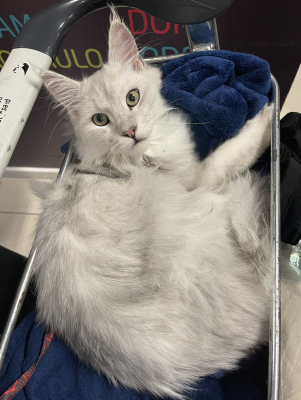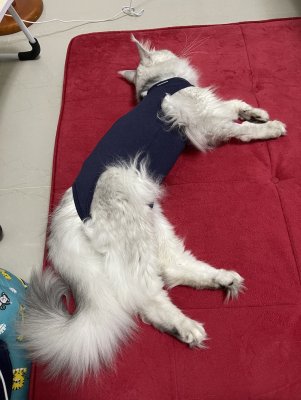- Joined
- Dec 1, 2021
- Messages
- 327
- Purraise
- 432
Hi all!
So, I'm normally around because my young cat has gastrointestinal issues (possible IBD, but we're treating the inflammation now and will see what happens next - he's doing well in this regard!). But, because I know this is a very common issue with Maine Coons, I asked my vet to have a look at his hip this week as well - he did so during a regular visit (by moving his leg, touching the bone), found nothing. I wanted to be sure anyway, so I asked for an x-ray to be done, and got it scheduled for the day after... turns out he not only has hip dysplasia, it's bad enough on one side that he needs immediate surgery - he has a luxation of the left femoral head. The vet team was shocked - you'd never be able to tell by observing his behavior or even touching him. He walks, jumps, grooms himself and all. The only reason I wanted to pay for an actual exam to confirm he didn't have anything was that my previous cat used to jump to more inconvenient places that I wish he didn't (that were often so high up I needed a damn ladder to get to!), and I noticed that, although this kitty does jump a lot, he doesn't seem as interested in those places. I initially thought he might have been too small, but as he grew up more it caught my attention - it was great for me, but... how come? Well, here we are.
We're hoping to get the surgery done next week. He's 1,2 years old and I'm told the prognosis is good, specially because it's a common surgery and he's very young. Still, if anyone has cared for a cat after this type of surgery, I'd love to get any tips - I know the orthopedist is going to guide me, but it could happen that one detail or another gets left behind because I won't think to ask about it.
Tips are specially welcome about expected litter box behavior post surgery - I figure I'll need a different box, so that he doesn't need to step high to get into it? Etc.
I don't know if anyone knows how to interpret these at all, but here are the x-rays in case you'd like to see it.



So, I'm normally around because my young cat has gastrointestinal issues (possible IBD, but we're treating the inflammation now and will see what happens next - he's doing well in this regard!). But, because I know this is a very common issue with Maine Coons, I asked my vet to have a look at his hip this week as well - he did so during a regular visit (by moving his leg, touching the bone), found nothing. I wanted to be sure anyway, so I asked for an x-ray to be done, and got it scheduled for the day after... turns out he not only has hip dysplasia, it's bad enough on one side that he needs immediate surgery - he has a luxation of the left femoral head. The vet team was shocked - you'd never be able to tell by observing his behavior or even touching him. He walks, jumps, grooms himself and all. The only reason I wanted to pay for an actual exam to confirm he didn't have anything was that my previous cat used to jump to more inconvenient places that I wish he didn't (that were often so high up I needed a damn ladder to get to!), and I noticed that, although this kitty does jump a lot, he doesn't seem as interested in those places. I initially thought he might have been too small, but as he grew up more it caught my attention - it was great for me, but... how come? Well, here we are.
We're hoping to get the surgery done next week. He's 1,2 years old and I'm told the prognosis is good, specially because it's a common surgery and he's very young. Still, if anyone has cared for a cat after this type of surgery, I'd love to get any tips - I know the orthopedist is going to guide me, but it could happen that one detail or another gets left behind because I won't think to ask about it.
Tips are specially welcome about expected litter box behavior post surgery - I figure I'll need a different box, so that he doesn't need to step high to get into it? Etc.

I don't know if anyone knows how to interpret these at all, but here are the x-rays in case you'd like to see it.
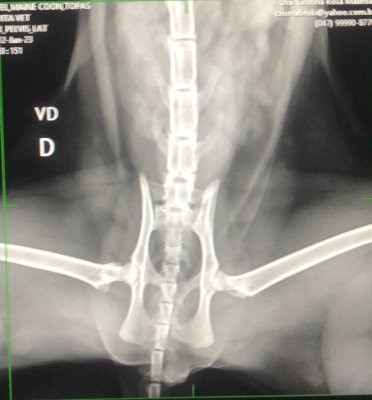
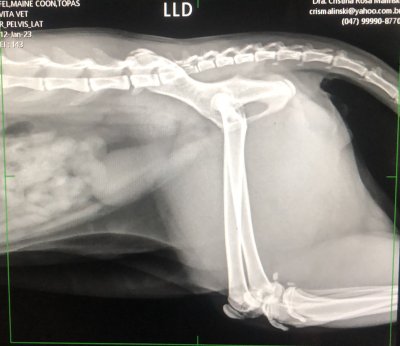
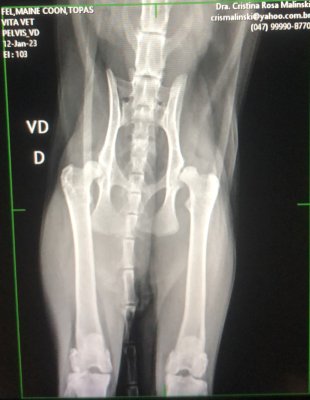
Last edited:




